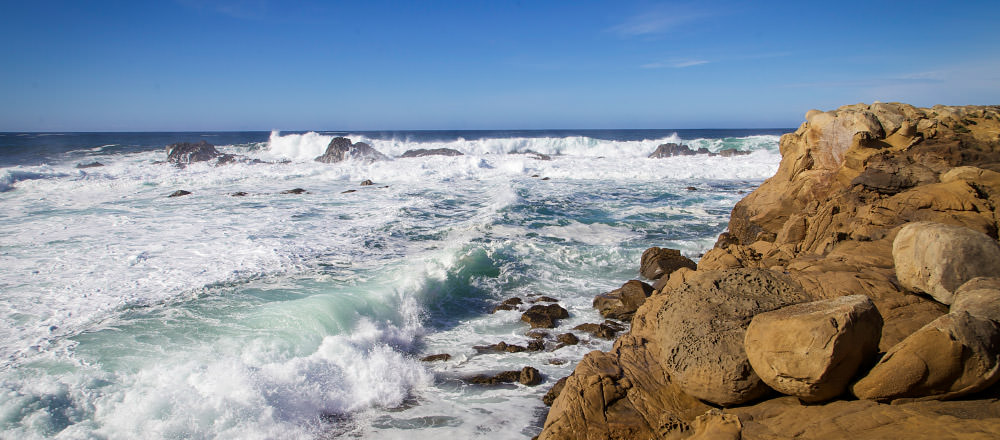
5th Ocean Climate Summit - April 2019
The 5th Ocean Climate Summit: Learning from the Past, Looking to the Future was held on Thursday, April 18 at the Fort Mason General’s Residence in San Francisco. Building on 10 years of progress since the first Summit, the 5th Ocean Climate Summit brought together 155 attendees to identify collective priority actions to further advance climate science, communication, and adaptation in order to better protect the North-central California coast and ocean from the impacts of climate change over the next 10 years. The program featured two plenary panels and four facilitated lightning talk sessions, as well as a networking reception.
Objectives:- Acknowledge and celebrate over 10 years of collective progress made since the first Ocean Climate Summit.
- Share the most up to date knowledge of climate trends, current impacts, and projected impacts to the North-central California coast and ocean.
- Connect people, information, and resources across disciplines in order to build upon existing collaborations and identify new, diverse partnerships.
- Identify next steps to: 1) promote coastal protection via living shorelines techniques; 2) engage and educate local communities on climate action; 3) support habitat protection and restoration projects that build ecosystem resilience; and 4) reduce the impact of non-climate stressors on coast and ocean resources.
Download the 2019 Ocean Climate Summit Report: Learning from the Past, Looking to the Future (PDF, 442 KB)
4th Biennial Summit - May 2016
The 4th Ocean Climate Summit: Resilience through Climate-Smart Conservation was held on Tuesday, May 17th, from 9:00 am - 6:30 pm at the Fort Mason General’s Residence in San Francisco. The goal of the summit was to improve the resilience of the North-central California coast and ocean to climate change through awareness, action, collaboration and leadership.
Objectives:- Build attendees’ understanding of trends in physical and biological indicators of climate change and other focal resources within the Northcentral California coast and ocean region
- Present the GFNMS Advisory Council climate adaptation planning process and coastal climate-smart adaptation strategies; share climate-smart conservation case studies, and project planning and implementation in order to promote resilience of coastal and marine ecosystems. Increase attendees’ understanding of local government efforts to incorporate sea level rise into Local Coastal Plans, General Plans and Local Hazard Mitigation Plans, and to promote collaboration amongst governments and sharing of lessons learned.
- Identify the connections of climateimpacts, as well as climate-smartstrategies and actions, between theNorth-central California outer coast andregional watersheds.
- Share innovative activities to engageyouth in coastal climate change andocean acidification.
- Connect information, resources, andpeople across disciplines in order tobuild upon existing collaborations andidentify new partnerships to promotethe resilience of North-centralCalifornia coast and ocean ecosystems.
Download the 2016 Ocean Climate Summit Report: Resilience through Climate-Smart Conservation (PDF, 975 KB)
3rd Biennial Summit - February 2013
The 3rd Biennial Ocean Climate Summit was held February 20, 2013 from 9:45AM - 3:30PM at the Golden Gate Club in the Presidio of San Francisco. The goal of the summit was to connect information, resources, and people across disiciplines to collaboratively sustain North-central coast and ocean ecosystem health through fostering awareness promoting action, and advocating climate smart conservation.
Objectives:- Recognize collaborative partnerships and successes in addressing ocean acidification impacts.
- Promote dialog, and share new information and tools across disciplines on climate change and ocean acidification.
- Discuss local collaborations that provide resources for climate adaptation planning / climate smart conservation.
- Build upon existing collaborations and forge new partnerships.
Download the 2013 Ocean Climate Summit Report: Strength Through Collaboration (PDF, 1.23 MB)
2nd Biennial Summit - June 2010
In partnership with California Academy of Sciences, the San Francisco Bay National Estuarine Research Reserve's Coastal Training Program and The 11th Hour Project, Greater Farallones National Marine Sanctuary, held the "Second Biennial Ocean Climate Summit: Moving from Knowledge to Action" at California Academy of Sciences on June 3, 2010. Invited attendees included scientists, marine resource managers, educators and public relations specialists from local agencies, non-profit organizations, and academic institutions who participated in breakout groups in the areas of public outreach, science and information, and innovation and adaptation.
Objectives:- Present and discuss the key findings and recommendations from the report, Climate Change Impacts: Gulf of the Farallones and Cordell Bank National Marine Sanctuaries.
- Frame a roadmap toward effective communication of these impacts to the public through common themes, messages, and hope for the future.
- Frame methods to promote efficient and effective communication on issues surrounding climate change impacts amongst scientists, natural resource managers, and communities.
- Frame strategies to move natural resource management from planning for today to planning for the future while faced with uncertainty.
Download the 2010 Ocean Climate Summit Report: Moving from Knowledge to Action (PDF, 850Kb)
1st Biennial Summit - April 2008
To lay a foundation for the Ocean Climate Initiative, the First Biennial Ocean Climate Summit was held in San Francisco in April 2008, bringing together over 100 participants representing federal, state, and local agencies, non-profit organizations, foundations, and academic institutions throughout the region.
Objectives:- Identify the key climate change factors affecting the San Francisco Bay Area's coast and ocean;
- Discuss the steps in research, outreach, and policy reform needed to address the carbon footprint affecting this region's coast and ocean;
- Determine how existing climate change programs can collaborate to help support the needs of the San Francisco Bay Area's coast and ocean;
- Identify the important critical marine habitats within the region that must be managed for resilience and sustainability; and
Promote partnerships amongst agencies, non-profit organizations, private businesses, and stakeholders. Still include pdfs that are already there.
Download 2008 Ocean Climate Summit Proceedings
View presentations made at the 2008 Summit (PDF, 22.4Mb)

